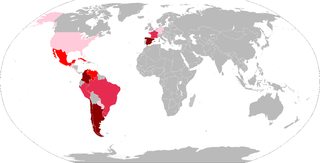Chilean Uruguayans are people born in Chile who live in Uruguay, or Uruguayan-born people of Chilean descent.
Many Chilean-born people live in Uruguay, for a number of reasons. Both countries are located in the Southern Cone and share the Spanish language; their historical origins are common (part of the Spanish Empire); circulation is relatively easy. Uruguay is a small, quiet country, with wide beaches on the Atlantic Ocean, so some well-off Chileans choose Uruguay as their usual holiday destination, some of them even as permanent residence. Chilean students have to pay high university fees in their country, so they come to Uruguay seeking a free university education. [1] Other Chileans of a lower social condition come to Uruguay in search of job opportunities, as part of a big inflow of Latin Americans migrating to Uruguay. [2]
The 2011 Uruguayan census revealed 1,682 people who declared Chile as their country of birth. [3] As of 2013, there are some 311 Chileans citizens registered in the Uruguayan social security. [4]

Uruguay, officially the Oriental Republic of Uruguay, is a country in the southeastern region of South America. It borders Argentina to its west and southwest and Brazil to its north and east, with the Río de la Plata to the south and the Atlantic Ocean to the southeast. Uruguay is home to an estimated 3.51 million people, of whom 1.8 million live in the metropolitan area of its capital and largest city, Montevideo. With an area of approximately 176,000 square kilometers (68,000 sq mi), Uruguay is geographically the second-smallest nation in South America, after Suriname.

The Southern Cone is a geographic and cultural region composed of the southernmost areas of South America, south of the Tropic of Capricorn. Traditionally, it covers Argentina, Chile and Uruguay, bounded on the west by the Pacific Ocean and on the east by the Atlantic Ocean. In terms of social, economic and political geography, the Southern Cone comprises Argentina, Chile, and Uruguay, and sometimes includes Brazil's four southernmost states. In its broadest definition, taking into account common history and geography, it also includes Paraguay, another Spanish-speaking country.

The Basque diaspora is the name given to describe people of Basque origin living outside their traditional homeland on the borders between Spain and France. Many Basques have left the Basque Country for other parts of the globe for economic and political reasons, with substantial populations in Colombia, Argentina and Chile with those of Basque ancestry in the hundreds of thousands; Mexico, Cuba, Venezuela and Uruguay, Canada, and the United States.
White Latin Americans, or European Latin Americans, are Latin Americans who are considered White, typically due to European descent. Latin American countries have often encouraged intermarriage between different ethnic groups since the beginning of the colonial period.

Greek Uruguayans are Uruguayan residents either fully or partially of Greek descent or Greece-born people who reside in Uruguay.

The history of the Jews in Uruguay dates back to the colonial empire. Perhaps the most important influx of Jewish population was during the 20th century, due to World War I and World War II. Uruguay's Jewish community is mainly composed of Ashkenazi. Uruguay is home to the fourth largest Jewish community in South America after Argentina, Brazil and Chile respectively and, as a proportion of the total population, the largest in all of Latin America.
Peruvian Uruguayans are mostly Peruvian-born persons living in Uruguay. There are as well some Uruguayan-born persons of Peruvian descent.

Immigration to Uruguay started with the arrival of Spanish settlers during the Colonial Period to what was then known as Banda Oriental. The immigration to Uruguay is very similar, if not the same, towards the Immigration to Argentina. Throughout history, Uruguay is known to gain massive waves of immigration all around the world, specifically European immigration, where today 90-95% of the Uruguayan population contains a European background. The climax of these immigration movements occurred during World War I and World War II, where the whole European continent was in a very unsettling position. The most highlighted group of immigrants in Uruguay are the Spaniards and Italians, both establishing the backbone of modern day Uruguayan culture and society.

Argentine Uruguayans are people born in Argentina who live in Uruguay. In 2010, there were over 10,000 Argentines living in Uruguayan territory.

Brazilian Uruguayans are people born in Brazil who live in Uruguay, or Uruguayan-born people of Brazilian descent.

Emigration from Uruguay is a migratory phenomenon that has been taking place in Uruguay since the early 20th century.
Paraguayan Uruguayans are people born in Paraguay who live in Uruguay, or Uruguayan-born people of Paraguayan descent.
Americans in Uruguay are mostly persons born in the United States and living in Uruguay. There are as well some Uruguayan-born persons of American descent.
Cuban Uruguayans are people born in Cuba who live in Uruguay, or Uruguayan-born people of Cuban descent.
Mexican immigration to Uruguay comprises people born in Mexico and who live in Uruguay, or Uruguayan-born people of Mexican descent.
Dominican Uruguayans are people born in the Dominican Republic who live in Uruguay, or Uruguayan-born people of Dominican descent.
Bolivian Uruguayans are people born in Bolivia who live in Uruguay or Uruguay-born people of Bolivian descent.
Ecuadorian Uruguayans are people born in Ecuador who live in Uruguay, or Uruguayan-born people of Ecuadorian descent.
Venezuelan Uruguayans are people born in Venezuela who live in Uruguay, or Uruguayan-born people of Venezuelan descent.
Colombian Uruguayans are people born in Colombia who live in Uruguay, or Uruguayan-born people of Colombian descent.
| This article article about the history of Uruguay is a stub. You can help Wikipedia by expanding it. |
| This Chile-related article is a stub. You can help Wikipedia by expanding it. |